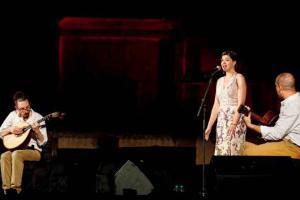Which is just as well, because in a world where music is shifting more and more towards upbeat tracks and dance-floor burners, some age-old melodies need to be preserved to assuage a broken heart

Ana Pinhal performs at Mehrangarh Fort. Pic courtesy/Jodhpur RIFF
Audience members at the sprawling Old Zenana Courtyard at Mehrangarh Fort had returned to their seats after dancing their feet off. A group of Manganiyar folk musicians had completed a roaring set that comprised a playful use of percussion instruments and joyous vocals. But the stage at Jodhpur RIFF 2018 was now set for a polar-opposite sound. An air of melancholy was about to envelop the premises of the music festival held in October, as Ana Pinhal — a fado singer from Portugal — took the stage resplendent in a floral off-white gown.
ADVERTISEMENT
And for the next 45 minutes, Pinhal pulled at our heartstrings like a lover wailing mellifluously for her partner, who she longs for. With simply a classic acoustic and a traditional Portuguese guitar as accompaniments, she showcased the finest traditions of a genre that is synonymous with songs from her homeland. This isn't music meant to pep you up. Instead, it's meant to invoke a sense of emptiness that's akin to the feeling a person gets when sitting by a window alone at home, looking at a vacant street that's devoid of life.
For, despite its disputed history, an overarching sense of longing characterises the genre. Some say it originates from tunes that sailors would compose for their beloved, who they had to leave behind when Portuguese ships set out for trade with the world in the early 19th century. Others say that it was born out of the melodic sadness of Brazilian slaves, who pined for home after being brought en masse to Portugal in the early 1800s. Still another version attributes it to forlorn Moors who were forced to stay back in Iberia after a Christian takeover. Yet, take any of these theories, and the haunting compositions that typify fado music still make complete sense.
But is this archaic genre now under threat in the modern era? When we had asked Pinhal this question after her performance, she had told us, "Not at all. I am sure that the traditional way of singing these songs will never end," adding, "To give you an example, I have a project where I play fado music, but not with the usual instruments. So, it's a form of fusion. And I had some people coming up to me after a concert and saying, 'I never thought that it could sound so great. Can you tell me more about the original songs?' Thus you can see that new forms of playing this music will only help the traditional style survive longer, despite any apprehensions that the older generation might have."
Which is just as well, because in a world where music is shifting more and more towards upbeat tracks and dance-floor burners, some age-old melodies need to be preserved to assuage a broken heart.
Log on to The YouTube page of Fado Violado, a fusion project that Ana Pinhal has formed
Sun, sand and fado
Although fado music is a relatively unknown entity in the rest of India, there is one place where it's popular and that is — you guessed it — Goa. The former Portuguese colony has a rich history of fado singers, or "fadistas", of whom Sonia Shirsat is the most recognisable name. There is even a fado competition held in the state every November.
Catch up on all the latest Mumbai news, crime news, current affairs, and also a complete guide on Mumbai from food to things to do and events across the city here. Also download the new mid-day Android and iOS apps to get latest updates
 Subscribe today by clicking the link and stay updated with the latest news!" Click here!
Subscribe today by clicking the link and stay updated with the latest news!" Click here!






